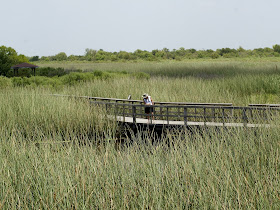On Saturday we headed down to Brazoria National Wildlife Refuge. This used to be one of our favorite birding sites but it was so badly affected by Hurricane Ike that we stopped visiting about three years ago. This weekend's trip was prompted by seeing birding reports from there posted by other birders.
First impressions weren't good! The entrance road was dry and empty of birds. The pond by the visitor center looked dry also ...
but it turned out to have some water in it.
A Least Bittern disappeared into the reeds before I could get a photo. An alligator wasn't so shy.
Several White Ibis flew over, followed by a much more interesting bird, a Wood Stork.
Parts of the auto-loop were depressingly dry.
However, Olney's Pond had plenty of water - and plenty of birds.
Most of the birds seemed to be of three species: Great Egret, Snowy Egret and White Ibis.
Great Egrets were easy to pick out because of their height.
Snowy Egrets were fewer in number.
Many of the White Ibis were adults and therefore almost completely white. However, there were quite a few juveniles also.
Not surprisingly given the crowded conditions, tempers sometimes frayed a little. Here two adult White Ibis got into an argument that was more dramatic than truly violent.
A careful look over the pond turned up several other species: Great Blue Heron (below), Little Blue Heron and a dozen or more Tricolored Herons.
Among the most numerous birds were Yellow-crowned Night Herons, almost all immature birds.

Here and there, Roseate Spoonbills added a splash of pink, although some Spoonbills were juveniles and therefore still very pale.
As the heat was brutal and the light was very harsh for photos, we decided to leave Brazoria and to head for the coast, stopping off at the Texas Sea Center in Lake Jackson on the way. We limited our visit o a walk along the very attractive boardwalk at the front of the center.
I would have missed this Little Blue Heron if Dee hadn't pointed it out to me.
A White Ibis was much harder to miss.
Two other White Ibis were grazing nearby.
The only other birds visible were a family of Black-necked Stilts.
When we arrived at Surfside, we found that there was an entrance fee to drive onto the beach. As we were only going to stay for a short while, we drove a few miles further east until we found a free beach.
A drive along the beach turned up very few birds, except for the inevitable Laughing Gulls.
Several Ruddy Turnstones were wandering along the sand, sometimes accompanied by Sanderlings.
The Turnstones looked particularly splendid in their breeding plumage.
A solitary Willet prowled along the water's edge, stopping occasionally to dig for food.
When walking, Willets are very nondescript birds. However, when they open their wings, they are anything but nondescript!
By now it was almost 3:00 pm, the check-in time at our hotel, and so we headed back up 288 to Clute. The plan was for Dee to rest up in the hotel while I drove back to Brazoria to take some more photos.
.

























I haven't checked out your blog in such a long time (totally my own fault, I need to make more of an effort) it's great to see fantastic posts from you still! I think the Willet is quite a beautiful bird!
ReplyDeleteHi, Pam. I haven't been posting much lately cos I've been too busy - plus this is a HOT summer even for Texas.
ReplyDeleteNormally Willets are beautiful in a subtle way. Then they open their wings and they are beautiful in a very unsubtle way!
Life gets away with you doesn't it and I should imagine the heat is uncomfortable to say the least! Definitely agree about the Willets!
ReplyDelete